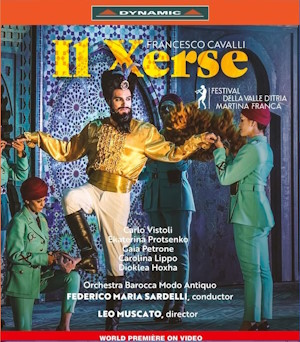
Francesco Cavalli (1602-1676)
Il Xerse (1655)
Carlo Vistoli (counter tenor) Xerse
Ekaterina Protsenko (soprano) Amastre
Gaia Petrone (mezzo) Arsamene
Carolina Lippo ( soprano) Romilda
Dioklea Hoxha (soprano) Adelanta
Carlo Allemano (tenor) Ariodate
Orchestra Barocca Modo Antiquo/Frederico Maria Sardelli
rec. live, 29-31 July 2022; Teatro Verdi, Martina Franca, Italy
Dynamic 57983 Blu-ray [161]
The operas of Francesco Cavalli have been enjoying something of a resurgence in the last few years. It was not all that long ago that the idea of exhuming one of these works was something that could only be done in a festival environment such as Glyndebourne of the 1960s. Now, productions of La Calisto, Il Giasone, or Ercole amante are more frequently encountered in the season plans of several opera companies. Il Xerse was popular enough in its day that it was even chosen to be performed during Louis XIV’s 1660 wedding festivities, but by my reckoning, it remains a comparatively rarely seen opera when compared to Cavalli’s other works. In 1985 the Harmonia Mundi released the only previous recording of the opera, which featured René Jacobs doing double duty as both conductor and singing the role of Xerse. This Dynamic release indicates that it is based on Bärenreiter’s recent critical edition of the score. It is worth noting that the Jacobs recording has an extra hour of music when compared to this video recording. Unfortunately the booklet gives no details about the critical edition or what has been shorn from the score.
The plot of the opera follows roughly the same course that Handel’s Serse does, which was created for his London company in 1738. Cavalli’s work tends to proceed at a more breakneck pace than the Handel opera, as befits the more overtly comic style of 17th century Italian opera. Stage director Leo Muscato, has contrived a reasonably lively staging and does his best to try to clarify the frantic pace of development of the story. However; he has sabotaged the staging by a using ridiculous device to highlight when a performer is singing an aside. There are literally hundreds of asides in the recitatives, which often follow one another without pause. Muscato’s unfortunate choice becomes irritating after the first two minutes and then has to be endured for the duration of the opera. Fortunately there is some compensation in Andrea Belli’s beautiful and practical set of varied Turkish doorways and Giovanna Fiorentini’s effective costumes, which are updated to the modern era.
The character of Cavalli’s King Xerse is even more wayward and self-indulgent than Handels’ is. Carlo Vistoli embodies the unpredictable king with a handsome appearance and rounded, golden vocal timbre. His singing of the Third Act lament “Lasciatemi Morir” is beautifully controlled. On the Harmonia Mundi recording René Jacobs sings with a narrower tone than Vistoli, but he is better at conveying the unpredictable nature of Xerse. Another notable performance comes from Gaia Petrone as Arsamene. Her richly solid voice easily engages one’s sympathy for the unfortunate brother of the King. Ekaterina Protsenko turns in a charming performance as the rejected Princess Amastre. Nicolò Donini shows himself to be an excellent addition to the ranks of Buffo basses.
The remainder of the cast are perhaps somewhat less vocally opulent but all turn in competent performances. Carlina Lippo has a penetrating tone which is not always sweet-sounding. Both she and Dioklea Hoxha’s occasionally shrill-sounding Adelanta, are hampered by silly, unflattering wigs which interfere in their connecting with the viewer. Carlo Allemano’s Ariodate is an interesting conundrum because although his tenor is at times no longer ideally steady, he possesses a magnificent stage presence which enlivens every scene he takes part in. He singlehandedly demonstrates what is lacking from the majority of the cast.
Frederico Maria Sardelli leads a crisp and energetic performance. The recording made in the small Teatro Verdi captures the Orchestra Barocca Modo Antiquo with clarity and keeps the voices forward the stage in perspective. The picture quality and camera direction are consistently superb.
Mike Parr
Help us financially by purchasing from



Additional cast members
Nicolò Donini – Aristone (bass)
Nicolò Balducci – Periarco (counter tenor)
Aco Biscevic – Elviro (tenor)
Mario Fumarola – Cupido (actor)
Production details
Director – Leo Muscato
Set designer – Andrea Belli
Costume designer – Giovanna Fiorentini
Lighting designer – Alessandro Carletti
Technical specifications
Region code: All regions
Sound formats: PCM Stereo 2.0; DTS HD Master Audio 5.1
Video: 1080i 60 BD 50
Subtitles: Italian, English, French, German, Korean, Japanese


















